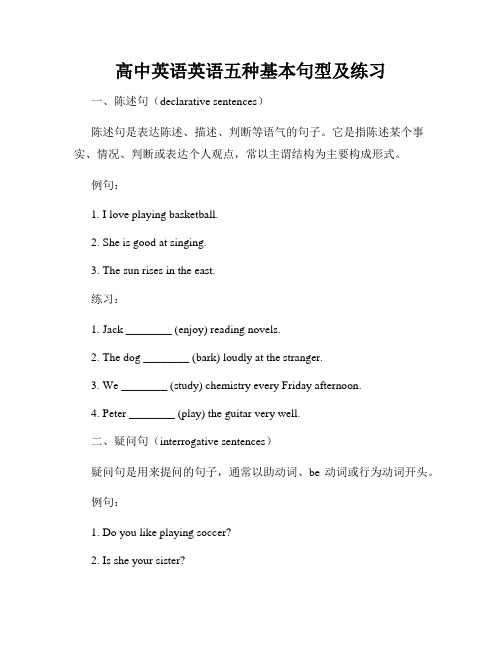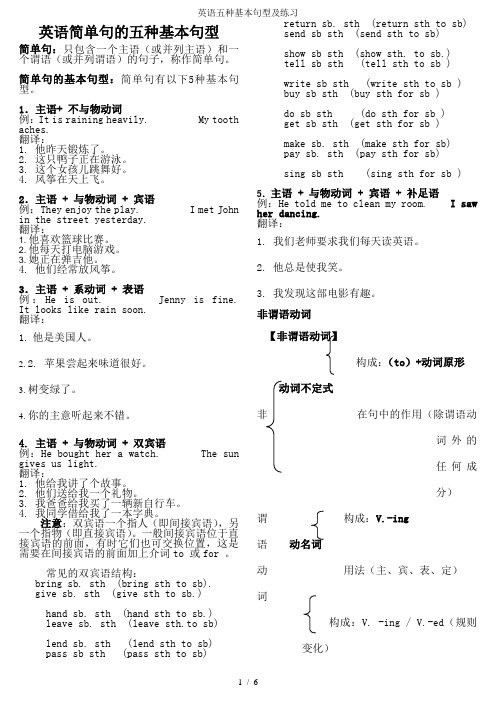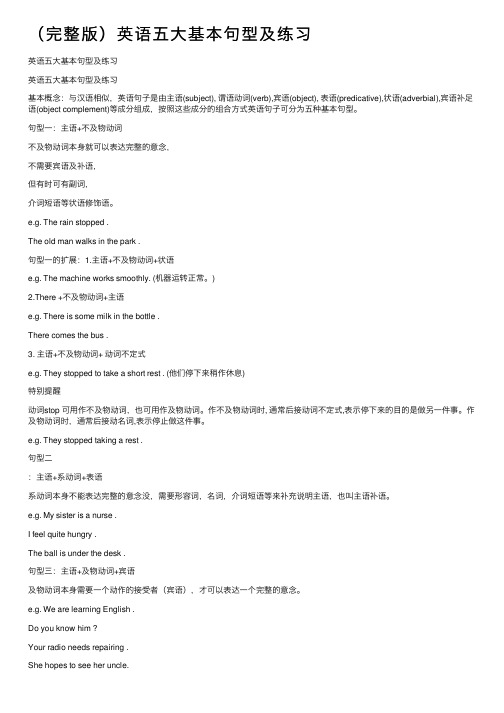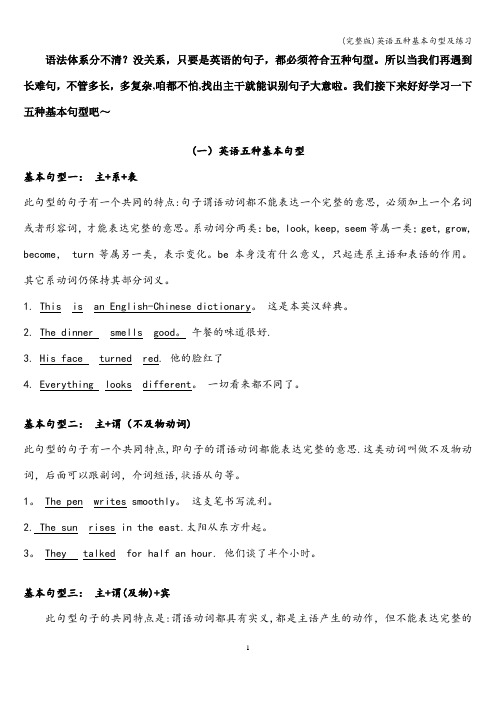英语五种基本句型及练习
五种基本句型(含练习及答案)

报的一位记者作有关东欧目前局势的重要报告。
翻译:我们发现大礼堂坐满了学生和教师,在听人民日报的 一位同志作有关东欧目前局势的重要报告。
???分析结构: 我们 发现(谓语) 大 礼堂 full of 学生和老师(复数) who 在听(谓语)重要 报告 made by 一位同志 from 人民日报 about 目前局势 in 东欧。
SV 2.My grandma is sleeping now. 3.I will stay in Shanghai for a week.
4.Lucy arrived in Beijing yesterday
基本句型 二
S +V +O(主+谓+宾)
特点:谓语动词都是实义动词,但不能表达 完整的意思,必须跟宾语,即动作的承受者, 才能使意思完整。这类动词叫做及物动词。
▪ leave(留给某人……), leave sb sth (leave sth to sb)
▪ pass(递给某人……), pass sb sth (pass sth to sb)
▪ read(给某人读……), read sb sth (read sth to sb)
▪ write(给某人写……), write sb sth (write sth to sb)
▪ pay(支付给某人……), pay sb sth (pay sth for sb)
▪ buy(为某人买……), buy sb sth (buy sth for sb)
▪ do(为某人做……) do sb sth (do sth for sb)
▪ sing(为某人唱……) sing sb sth (sing sth for sb)
英语五种基本句型及例句doc

英语五种基本句型及例句.doc 英语中有五种基本句型,它们是:S+V、S+V+O、S+V+I、S+V+O+O、S+V+C。
下面是每种基本句型的例句:1.S+V (主语+动词) 例句:•I study English.(我学习英语。
)•He runs every morning.(他每天早上跑步。
)•They play football on weekends.(他们周末踢足球。
)2.S+V+O (主语+动词+宾语) 例句:•She reads a book.(她读一本书。
)•We eat lunch at noon.(我们中午吃午饭。
)•They watch a movie on Friday night.(他们星期五晚上看电影。
)3.S+V+I (主语+动词+表语) 例句:•He is a doctor.(他是个医生。
)•She became famous.(她变得出名。
)•They feel happy.(他们感到快乐。
)4.S+V+O+O (主语+动词+宾语+宾语补足语) 例句:•She made me a cake.(她给我做了一个蛋糕。
)•They elected him class monitor.(他们选他当班长。
)•We consider the party a success.(我们认为这次派对很成功。
)5.S+V+C (主语+动词+补语) 例句:•He is a student.(他是个学生。
)•They are happy.(他们很快乐。
)•She feels tired.(她感到疲倦。
)这些例句展示了五种基本句型的运用。
它们可以通过改变主语、动词、宾语等部分来构造更多的句子。
熟练掌握这些基本句型,对于学习英语语法和提高英语写作能力非常重要。
高中英语英语五种基本句型及练习

高中英语英语五种基本句型及练习一、陈述句(declarative sentences)陈述句是表达陈述、描述、判断等语气的句子。
它是指陈述某个事实、情况、判断或表达个人观点,常以主谓结构为主要构成形式。
例句:1. I love playing basketball.2. She is good at singing.3. The sun rises in the east.练习:1. Jack ________ (enjoy) reading novels.2. The dog ________ (bark) loudly at the stranger.3. We ________ (study) chemistry every Friday afternoon.4. Peter ________ (play) the guitar very well.二、疑问句(interrogative sentences)疑问句是用来提问的句子,通常以助动词、be动词或行为动词开头。
例句:1. Do you like playing soccer?2. Is she your sister?3. Where is the nearest supermarket?练习:1. ________ you watch TV last night?2. ________ the weather like today?3. ________ Tim have a new car?三、祈使句(imperative sentences)祈使句是用来表达命令、请求、建议等意思的句子。
它通常以动词原形开头。
例句:1. Please close the door.2. Study hard for the exam.3. Let's go for a walk.练习:1. ________ your homework before going to bed.2. ________ your parents for permission before going out.3. ________ up early tomorrow.四、感叹句(exclamatory sentences)感叹句用来表达强烈的感情、惊奇、赞美、喜悦等。
英语五大基本句型练习

英语五大基本句型练习1. Declarative Sentences (陈述句)- The sun rises in the east and sets in the west. (太阳从东方升起,西方落下。
)- She has completed her homework before dinner. (她在晚饭前完成了作业。
)2. Interrogative Sentences (疑问句)- Can you tell me the way to the library? (你能告诉我去图书馆的路吗?)- What time does the store open in the morning? (商店早上几点开门?)3. Imperative Sentences (命令句)- Please close the door gently. (请轻声关门。
)- Do not forget to turn off the lights when you leave. (离开时别忘了关灯。
)4. Exclamatory Sentences (感叹句)- How beautiful the flowers are! (这些花多美啊!)- What a wonderful day it is! (多么美好的一天啊!)5. Interrogative Sentences with Embedded Questions (含有疑问句的陈述句)- I wonder if it will rain tomorrow. (我想知道明天是否会下雨。
)- She asked where the nearest bus stop was. (她问最近的公交车站在哪里。
)。
英语五种基本句型及练习

英语简单句的五种基本句型简单句:只包含一个主语(或并列主语)和一个谓语(或并列谓语)的句子,称作简单句。
简单句的基本句型:简单句有以下5种基本句型。
1.主语+ 不与物动词 例:It is raining heavily. My tooth aches. 翻译:1. 他昨天锻炼了。
2. 这只鸭子正在游泳。
3. 这个女孩儿跳舞好。
4. 风筝在天上飞。
2.主语 + 与物动词 + 宾语 例:They enjoy the play. I met John in the street yesterday. 翻译:1. 他喜欢篮球比赛。
2. 他每天打电脑游戏。
3. 她正在弹吉他。
4. 他们经常放风筝。
3.主语 + 系动词 + 表语例:He is out. Jenny is fine. It looks like rain soon.翻译:1. 他是美国人。
2. 2. 苹果尝起来味道很好。
3. 树变绿了。
4. 你的主意听起来不错。
4. 主语 + 与物动词 + 双宾语例:He bought her a watch. The sun gives us light. 翻译:1. 他给我讲了个故事。
2. 他们送给我一个礼物。
3. 我爸爸给我买了一辆新自行车。
4. 我同学借给我了一本字典。
注意:双宾语一个指人(即间接宾语),另一个指物(即直接宾语)。
一般间接宾语位于直接宾语的前面,有时它们也可交换位置,这是需要在间接宾语的前面加上介词to 或for 。
常见的双宾语结构:bring sb. sth (bring sth to sb). give sb. sth (give sth to sb.)hand sb. sth (hand sth to sb.) leave sb. sth (leave sth.to sb) lend sb. sth (lend sth to sb) pass sb sth (pass sth to sb)return sb. sth (return sth to sb) send sb sth (send sth to sb)show sb sth (show sth. to sb.)tell sb sth (tell sth to sb ) write sb sth (write sth to sb ) buy sb sth (buy sth for sb ) do sb sth (do sth for sb ) get sb sth (get sth for sb ) make sb. sth (make sth for sb) pay sb. sth (pay sth for sb)sing sb sth (sing sth for sb )5.主语 + 与物动词 + 宾语 + 补足语例:He told me to clean my room. I saw her dancing. 翻译:1. 我们老师要求我们每天读英语。
(完整版)英语五大基本句型及练习

(完整版)英语五⼤基本句型及练习英语五⼤基本句型及练习英语五⼤基本句型及练习基本概念:与汉语相似,英语句⼦是由主语(subject), 谓语动词(verb),宾语(object), 表语(predicative),状语(adverbial),宾语补⾜语(object complement)等成分组成,按照这些成分的组合⽅式英语句⼦可分为五种基本句型。
句型⼀:主语+不及物动词不及物动词本⾝就可以表达完整的意念,不需要宾语及补语,但有时可有副词,介词短语等状语修饰语。
e.g. The rain stopped .The old man walks in the park .句型⼀的扩展:1.主语+不及物动词+状语e.g. The machine works smoothly. (机器运转正常。
)2.There +不及物动词+主语e.g. There is some milk in the bottle .There comes the bus .3. 主语+不及物动词+ 动词不定式e.g. They stopped to take a short rest . (他们停下来稍作休息)特别提醒动词stop 可⽤作不及物动词,也可⽤作及物动词。
作不及物动词时, 通常后接动词不定式,表⽰停下来的⽬的是做另⼀件事。
作及物动词时,通常后接动名词,表⽰停⽌做这件事。
e.g. They stopped taking a rest .句型⼆:主语+系动词+表语系动词本⾝不能表达完整的意念没,需要形容词,名词,介词短语等来补充说明主语,也叫主语补语。
e.g. My sister is a nurse .I feel quite hungry .The ball is under the desk .句型三:主语+及物动词+宾语及物动词本⾝需要⼀个动作的接受者(宾语),才可以表达⼀个完整的意念。
e.g. We are learning English .Do you know him ?句型四:主语+及物动词+间接宾语+直接宾语有些及物动词需要两个宾语才能表达⼀个完整意念。
(完整版)英语五种基本句型及练习

语法体系分不清?没关系,只要是英语的句子,都必须符合五种句型。
所以当我们再遇到长难句,不管多长,多复杂,咱都不怕,找出主干就能识别句子大意啦。
我们接下来好好学习一下五种基本句型吧~(一)英语五种基本句型基本句型一:主+系+表此句型的句子有一个共同的特点:句子谓语动词都不能表达一个完整的意思,必须加上一个名词或者形容词,才能表达完整的意思。
系动词分两类:be, look, keep, seem等属一类;get, grow, become, turn等属另一类,表示变化。
be 本身没有什么意义,只起连系主语和表语的作用。
其它系动词仍保持其部分词义。
1. This is an English-Chinese dictionary。
这是本英汉辞典。
2. The dinner smells good。
午餐的味道很好.3. His face turned red. 他的脸红了4. Everything looks different。
一切看来都不同了。
基本句型二:主+谓(不及物动词)此句型的句子有一个共同特点,即句子的谓语动词都能表达完整的意思.这类动词叫做不及物动词,后面可以跟副词,介词短语,状语从句等。
1。
The pen writes smoothly。
这支笔书写流利。
2. The sun rises in the east.太阳从东方升起。
3。
They talked for half an hour. 他们谈了半个小时。
基本句型三:主+谓(及物)+宾此句型句子的共同特点是:谓语动词都具有实义,都是主语产生的动作,但不能表达完整的意思,必须跟有一个宾语,即动作的承受者,才能使意思完整。
这类动词叫做及物动词。
1。
Who knows the answer?谁知道答案?2. He enjoys reading。
他喜欢看书.3。
My sister is writing a letter at this moment。
五种基本句型(含练习及答案)

句子是由主语、谓语动词、表语、宾语、宾语补足语等组成的。
英语句子有长有短,有简有繁,似乎千变万化,难以捉摸,但其实只有五种基本句型。
所有英语句子都可以看成是这五种基本句型的扩大、组合、省略或倒装。
因此掌握这五大句型,是掌握其他各种英语句子结构的基础。
英语句子依其组合方式可分为以下五种基本句型,句子成分的表示法为: S:Subject(主语), V:Verb (动词),O:Object(宾语), IO : Indirect Object (间接宾语), DO: Direct Object (直接宾语) , P:Predicative (表语), OC: Object Complement(宾语补足语)。
五种基本句型见下表(S=主,V=谓,O=宾,P=表,IO=间宾,DO=直宾,OC=宾补):种类句型例句第1种S+V We work. (不及物)第2种 S+V+O He plays (及物) the piano.第3种S+V+P We are(系动词) students.第4种 S+V+IO+DO She gave(及物) me a pen.第5种 S+V+O+OC He made(及物) the boy laugh.一、第1种句型:S+V(主语+不及物动词)1、Birds fly. 鸟飞。
主语+谓语 (不及物动词)2、He runs in the park. 他在公园里跑。
主语+谓语+地点状语 (不及物动词)此句型是“主语+不及物动词”构成句子的主体部分。
因为是不及物动词,后面当然不能带宾语了,但是可以有状语来修饰。
例如上面例句中的 in the park就是地点状语。
3、Class begins.(begin在句中是不及物动词)上课了。
比较:We begin our class at eight. 我们八点钟开始上课。
该句则属于第2种句型,begin在句中是及物动词,由此可见有些动词既可作及物动词也可以作不及物动词。
- 1、下载文档前请自行甄别文档内容的完整性,平台不提供额外的编辑、内容补充、找答案等附加服务。
- 2、"仅部分预览"的文档,不可在线预览部分如存在完整性等问题,可反馈申请退款(可完整预览的文档不适用该条件!)。
- 3、如文档侵犯您的权益,请联系客服反馈,我们会尽快为您处理(人工客服工作时间:9:00-18:30)。
英语简单句的五种基本句型简单句:只包含一个主语(或并列主语)和一个谓语(或并列谓语)的句子,称作简单句。
简单句的基本句型:简单句有以下5种基本句型。
1.主语+ 不及物动词例:It is raining heavily. My tooth aches.翻译:1. 他昨天锻炼了。
2. 这只鸭子正在游泳。
3. 这个女孩儿跳舞好。
4. 风筝在天上飞。
2.主语+ 及物动词+ 宾语例:They enjoy the play. I met John in the street yesterday.翻译:1. 他喜欢篮球比赛。
2. 他每天打电脑游戏。
3. 她正在弹吉他。
4. 他们经常放风筝。
3.主语+ 系动词+ 表语例:He is out. Jenny is fine. It looks like rain soon.翻译:1.他是美国人。
2.2. 苹果尝起来味道很好。
3.树变绿了。
4.你的主意听起来不错。
4. 主语+ 及物动词+ 双宾语例:He bought her a watch. The sun gives us light. 翻译:1. 他给我讲了个故事。
2. 他们送给我一个礼物。
3. 我爸爸给我买了一辆新自行车。
4. 我同学借给我了一本字典。
注意:双宾语一个指人(即间接宾语),另一个指物(即直接宾语)。
一般间接宾语位于直接宾语的前面,有时它们也可交换位置,这是需要在间接宾语的前面加上介词to 或for 。
常见的双宾语结构:bring sb. sth (bring sth to sb).give sb. sth (give sth to sb.)hand sb. sth (hand sth to sb.)leave sb. sth (leave sth.to sb)lend sb. sth (lend sth to sb)pass sb sth (pass sth to sb)return sb. sth (return sth to sb)send sb sth (send sth to sb)show sb sth (show sth. to sb.)tell sb sth (tell sth to sb )write sb sth (write sth to sb )buy sb sth (buy sth for sb )do sb sth (do sth for sb )get sb sth (get sth for sb )make sb. sth (make sth for sb)pay sb. sth (pay sth for sb)sing sb sth (sing sth for sb )5.主语+ 及物动词+ 宾语+ 补足语例:He told me to clean my room.I saw her dancing.翻译:1. 我们老师要求我们每天读英语。
2. 他总是使我笑。
3. 我发现这部电影有趣。
非谓语动词【非谓语动词】构成:(to)+动词原形动词不定式非在句中的作用(除谓语动词外的任何成分)谓构成:V.-ing语动名词动用法(主、宾、表、定)词构成:V. -ing / V.-ed(规则变化)分词用法(表、补、定、状)(一)动名词一、动名词的构成:动名词一般由“动词原形+ing”构成注意:英语中有一些词后面常跟动名词作宾语。
我们初中阶段常见的有:finish, mind, be worth, be busy, practice,have fun, have trouble/problem(in), spend...(in), feel like, be used to(习惯于), give up, keep on, consider, suggest, can't help。
我们可按下面的顺口溜记忆这些词。
完成实践值得忙(finish, practice, be worth, be busy)继续习惯别放弃(keep on, be used to, give up)考虑建议不禁想(consider, suggest, can't help, feel like)喜欢思念要介意(enjoy, miss, mind)一、动词不定时的构成不定时的基本形式为:to+动词原形,有时可以不用to,这里的to 是不定式符号,本身无词义,动词不定式的否定形式是not+(to+)动词原形。
二、动词不定式的句法功能1. 不定式作主语动词不定式作主语时,常用it作形式主语,而将真正的主语放在句末如:To learn English well is useful.→It is useful to learn English well.It’s important for us to protect the environment.注意:在kind,good,nice,clever等表示人的品质的形容词后,不用for而用of。
如:It's very kind of you to help me. 你帮助我真是太好啦。
It's very clever of you to do like that.你那样做真是太聪明啦。
2. 不定式作宾语有些谓语动词后只能用不定式作宾语,常见的这类词是表示命令、打算或希望的,如:would like, like, want, wish, hope, decide, plan, expect 等。
如:Would you like to see a film this evening? 你今晚想去看电影吗?②在find, think后跟不定式作宾语时,常用it代替,而将真正的宾语放在后面。
如:I find it easy to read English every day.③常见的一些不带to的动词不定式Why not do..., Why don't you do..., had better(not)do..., would rather do,could/would/will you please(not)do...I would rather stay in the room.我宁愿待在房间里。
3. 不定式作宾语补足语不定式作宾语补足语时与宾语有逻辑上的主谓关系。
如:Lucy asked him to turn down the radio. 露西让他关小收音机。
tell, ask, want, allow, get, would like, encourage后常跟动词不定式作宾语补足语。
如:My mother encourages me to learn Japanese. 我妈妈鼓励我学日语。
注意:还有一些使役动词和感官动词也用不定式作宾补,这时不定式要省略to。
这些动词有:一感(feel)、二听(hear, listen to)、三让(let, make,have)、四看(look at, see, watch, notice)。
但变被动语态时,必须加上My friends were made to work the whole night by theboss. 老板让我的朋友们工作了一整夜。
4. 不定式作定语①不定式作定语时,应放在名词之后。
②There is nothing to worry about. 没有什么可担心的。
③Beijing is a good place to visit.5.不定式常和疑问词what, which, when, where, how连用,相当于一个宾语从句。
如:The teacher is telling the students what to do. 老师正告诉学生们做什么。
He didn't know where to go. 他不知道去哪里。
例题( )1. Tom's mother told him _______ eating too much meat.A: stopping B: to stop C: stops D: stopped ( )2. We don't know _____ it next. Let's go and ask Mr. Li.A: what to do B: to do whatC: whether to do D: to do whether ( )3. How kind you are! You always do what you can ____me.A: help B: helping C: to help D: helps ( )4 Drivers shouldn't be allowed ________after drinking, or they will break the law.A: drive B: driving C: to drive ( )5. Water Park is a good place________.A: to have fun B: have funC: having fun D: to have a fun ( )6. Take time to relax by listening to music, reading a book or just spending some time alone.Relaxing allows you _______to your studieswith more energy.A: return B: to return C: returning ( )7. Nick, would you mind ________those old jeans? They look terrible.A: not to wear B: not wearC: wearing not D: not wearing ( )8. —_______ a volunteer is great.—I think so. Some of us want _______volunteersfor the London Olympics.A: Being;being B: To be;beingC: Being;to be D: To be;to be ( )9.—Don't forget ______your history and politics books tomorrow morning.—Thanks. I won't.A: bring B: to bring C: bringing ( )10.—What about _______a rest?—OK. Let's go out and have a walk.A: to take B: takes C: taking( )11. —I like this set of sofa so much, but I don't know ______it in my small house.—You're supposed to put it in the living room.A: where to put B: why to putC: how to put( )12. While we were running on the playground, Jack suddenly stopped ______and lay on the ground, so we all stopped _______what was wrong with him.A: to run; to see B: running; seeingC: running; to see( )13. May I have a rest? I have already finished ______the report.A: write B: writing C: to write D: written ( )14.—I feel a bit hungry now.—Why not _______for dinner with us?A: go B: did you go C: to go D: do you go 练习( )1. Granny often tells us __water in our daily life.A: save B: saving C: to save D: saves ( )2. Richard turned off the computer after he had finished ________the email.A: write B: to write C: writing D: wrote ( )3.—We can use QQ to chat with each other on the Internet.—Really? Will you please show me ______it?A: how to use B: what to useC: how can I use D: what can I use ( )4.—Where's your brother now,Bob?—I saw him ________ in the street a moment ago and I told him _______.A: playing;don't do so B: playing;not to do so C: play;to do so( )5. As teenagers, we're old enough _______with housework. We can help set the table, wash thedishes and clean our own rooms.A: to help B: helping C: helped ( )6. Nancy is really a hard-working student. We often see her _______books in the classroom.A: read B: to read C: reads ( )7 Mrs. Smith made her students _______the compositions three times a week.A: write B: to write C: written D: writing ( )8.Tom often makes his sister ,but yesterday he was made by his sister.A: cry; to cry B: to cry; cryC: cry; cry D: to cry; to cry ( )9. You'd better _______ too much time playing computer games.A: don't spend B: not to spendC: to not spend D: not spend( )10. More and more young people are trying to do something _______the old.A: served B: to serve C: serve D: serves ( )11. Why not _______ an English club to practice _ ______ English?A. to join; to speakB. join; speakingC. join; to speakD. to join; speaking ( )12. When we came to the gate, he stopped _________ me go in first.A. to letB. to tellC. to allowD. to ask ( )13. She saw some boys _________ soccer on the playground when she was on the way to theclassroom.A. playedB. to playC. playing ( )14. —How about going shopping this weekend, Peter?—Sorry, I prefer _____ rather than _____.A. to stay at home; go outB. to go out; stay at homeC. staying at home; go outD. Going out; stay at home( )15. It's a good habit _________ every day.A. to keep doing exerciseB. to stay up lateC. to make much noiseD. to too much ( )16. —It's hot. Would you mind my _____the window.—__________. Do it as you like, please!A. to open; OKB. opening; Certainly notC. closing; Of courseD. Open; Good idea ( )17. Who do you think you'd like _____with you,a boy or a girl?A. to let to goB. letting to goC. to let goD. let go( )18. The house was so dirty. They decided ____.A. clean it upB. to clean it upC. clean up itD. cleaning up( )19. I heard someone ____the door and .A. open; come inB. to open; to come inC. open; come intoD. to open; to come into ( )20. The girl was heard _____ the piano in the next room.A. playsB. to playC. playedD. playII.选择填空。
